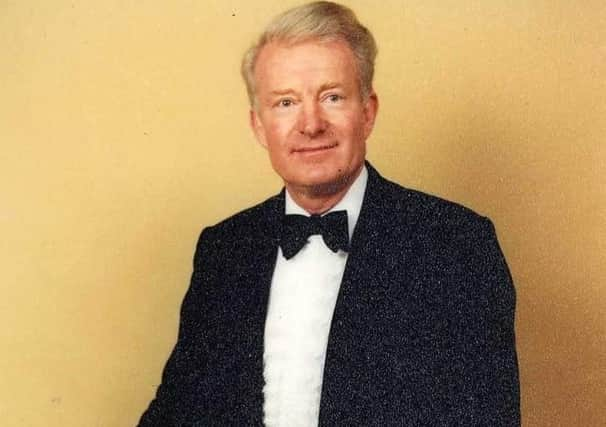Obituary: Bruce Thomson, GP, rugby internationalist and bagpipe player and composer


With the pre-match displays from the massed pipes and drums being such a time-honoured part of the Murrayfield International match day experience, it might be fitting if compositions by Bruce Thomson – the former Scotland prop and well-known and prolific composer of bagpipe music, found their way onto the play list. Dr Thomson died recently, in the 90th year of a life well-lived.
He was born in Assam, India, where his Peterhead-born father was a tea planter. Aged six, however, he was sent home to be educated, initially at Angusfield Preparatory School, then Aberdeen Grammar School. In 1943 his Buchan-born mother travelled home from India to vet potential public schools in Scotland, eventually settling on Glenalmond College as the establishment best suited to the education of her son.
Advertisement
Hide AdAdvertisement
Hide AdWhen he arrived at Glenalmond, Bruce was already au fait with the two biggest influences in his life, rugby and bagpiping. At the Perthshire School, he graduated through the ranks to play in the XV, while alsobecoming Pipe Major in the school pipe band.
In this facet of his life he benefitted from some excellent tutors. The Glenalmond band was taught by Pipe Major Sinclair of the Black Watch, who travelled out from Perth to coach the boys.
Then, during summers spent with relatives in Aberdeen, he came under the influence of Pipe Major Cherry Anderson of the Gordon Highlanders, and played in the City of Aberdeen Pipe Band.
Leaving school, he did his National Service, initially with the Royal Corps of Signals, before being commissioned into the Gordon Highlanders for the remainder. As an officer he could not play in the regimental band, but, he benefitted from personal tuition from the great Pipe Major Donald MacLeod, the “Piper of the Century.”
National Service over, he went up to Keble College, Oxford, to read History. Here he was a double Blue, in boxing and rugby, featuring in the 1951 Varsity Match, which Oxford won13-0 to complete a run of four straight wins. He played again in 1952, when Cambridge finally triumphed.
His performances for Oxford got him into the December, 1952 Scotland Trials, prior to winning his first cap, against France, at Stade Colombes, in January, 1953.
France won 11-5, but he kept his place for the Welsh game at Murrayfield, which the visitors won 12-0. However, he was retained for the next match, again at Murrayfield. This finished 26-8 to Ireland and Bruce suffered a knee injury which effectively ended his top-flight rugby career. His three games were losses eight, nine and ten in the dismal 17-game losing run between 1951 and 1955.
Complete with his Honours MA degree in History, Bruce then tried teaching, which he hated. He was now playing for London Scottish, which opened doors to a business career; again, however, this left him unhappy with his lot, so, he undertook a complete career change.
Advertisement
Hide AdAdvertisement
Hide AdHe always insisted his rugby CV was a major factor in him gaining admission to the London Hospital’s doctors training scheme. He certainly went on to captain the hospital’s rugby team in the ultra-competitive London Hospitals Cup competition, on his way to qualifying and settling for life as a GP.
He learned the ropes of general practice in Oxfordshire, before going on to spend the remainder of his career in a four-partner practice in Horsham, West Sussex, for over 30 years.
Retirement took him first to Brighton, before he returned “home” to Perthshire to settle in Crieff.
After hanging-up his rugby boots, Bruce was able to give more time to the pipes, and to composing pipe tunes, of which he would write over 450, some of which have become bagpiping “standards”.
He also learned the accordion and played in a popular local dance band with a well-known fiddler. He also played the bagpipes with the Pride of Sussex Pipe Band. He was also a member of the Caledonian Society of London and the Highland Society of London.
On retiring back to Scotland, he continued to play with the College of Piping Veterans and the Royal Scottish Pipers Society in Edinburgh.
He also played several times in front of both the Queen and Queen Elizabeth the Queen Mother.
As a composer, his “breakthrough” piece was his 1978 9/8 retreat march, “The Pass of Bradner’ – which won him the prestigious Castle Minard Prize. This, his “The Portsonachan Cook” and “Nikki Thomson’s Wedding”, composed to mark his first marriage, are included in his old regiment, the Gordon Highlanders’ regimental bagpipe book.
Advertisement
Hide AdAdvertisement
Hide AdAnother of his pieces: “Tommy Macdeonald of Barguillean”, was chosen as their march-on piece by the Shotts and Dykehead Caledonian Band for the 2008 World Pipe Band Championships. It is a typical Bruce Thomson tune – highly melodic, highly original a breath of fresh air, lingering-on, long after being heard.
Bruce was married twice, initially to Nikki, then, after her death, to Gillian, who, like Nikki died prematurely from illness.
Bruce is survived by sons James and Ewan, and seven grandchildren.
Bruce Thomson enjoyed a long and fulfilling life and certainly left a rich legacy in his pipe music and from his long service as a local GP.
Being a double Blue at Oxford and a Scotland rugby cap – players only ever get the one – is not to be sniffed at either.
MATTHEW VALLANCE
Comments
Want to join the conversation? Please or to comment on this article.